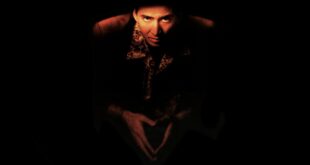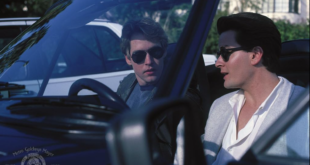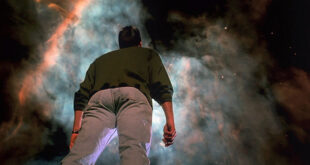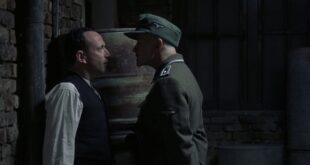Joel and Ethan Coen occupy a special place in my heart as a lifelong fan of motion pictures. They are known for their comedies and noir films, bringing distinct quirks, characters, dialogue, and production design. They’re unique among many filmmakers. You can always tell when watching a Coen Brothers film. My favorites of theirs include Blood Simple, Miller’s Crossing, Barton Fink, Fargo, The Big Lebowski, and No Country For Old Men. Sandwiched in between Barton Fink and Fargo was The Hudsucker Proxy in 1994. Despite receiving mixed reviews and bombing at the box office, many quality elements in The Hudsucker Proxy went overlooked. While it has maintained a cult following over the years, I would argue it’s one of the most Coen Brothers of Coen Brothers movies. There’s a joy one gets watching the Coens’ passion for cinematic storytelling.
The Hudsucker Proxy was the Coens’ first real chance to make a big-time studio picture. Having received acclaim for Blood Simple, Miller’s Crossing, and Barton Fink (which won the Palm d’Or), the Coens’ had already established what makes them unique as filmmakers. By 1994 they were recognized as exceptional, original filmmakers. The Hudsucker Proxy was like the build-up of all the films they made before. It’s a madcap satire with wry humor and grandiose dream-like scenes. The biggest complaint against it critically was the lack of the human element, which I don’t think is necessarily true. There’s a sad but truthful element to the main characters, even with all the silliness around them. Hudsucker is the Coens’ love letter to the sentimental screwball comedies of the past. It combines Preston Sturges, Frank Capra, and Howard Hawks.
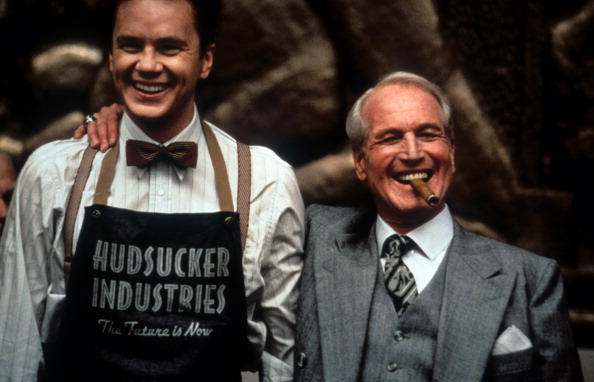
Tim Robbins stars as Norville Barnes, a naive small-time dreamer from Muncie, Indiana, whose boundless optimism catapults him to the top of Hudsucker Industries while also being blinded to the head of the board of directors Sidney J. Mussburger using him as a cynical ploy to crash the stock of Hudsucker. Mussburger is played by Paul Newman, who fits wonderfully into the Coens’ wry sense of humor. However, Jennifer Jason Leigh steals the show as Amy Archer, a Pulitzer Prize-winning reporter who initially sets out to deceive Norville into giving away corporate secrets. She also lives in the cynical world of newspaper reporting and has no problem fitting in as “one of the guys.” The funny thing, though, is she ends up being captivated by Norville’s plucky optimism and falls for him. Leigh’s full-throttle performance, complete with a heavy mid-Atlantic accent, consumes all the energy in the room and redirects it throughout the other characters. It’s a marvelous work and a dream part to play, the fast talker in a Coen Brothers picture.
The plot’s main thrust is Norville’s rise and corruption through corporate America, which the Coens’ have a cynical eye towards. I wouldn’t describe this film as Marxist, but they have a distaste for the Capitalist corporate system. Early scenes of Norville in the mailroom at Hudsucker exemplify the fruitlessness of the corporate machine. Everything is ramped up to eleven. Those scenes reminded me of Charlie Chaplin’s Modern Times, to which Hudsucker owes somewhat of debt, and Fritz Lang’s Metropolis. Norville invented a simple thing like the hula hoop, becoming a massive hit. He shows Paul Newman his big idea for the next big thing, and it’s just a picture of a circle. “Would an imbecile come up with this?”
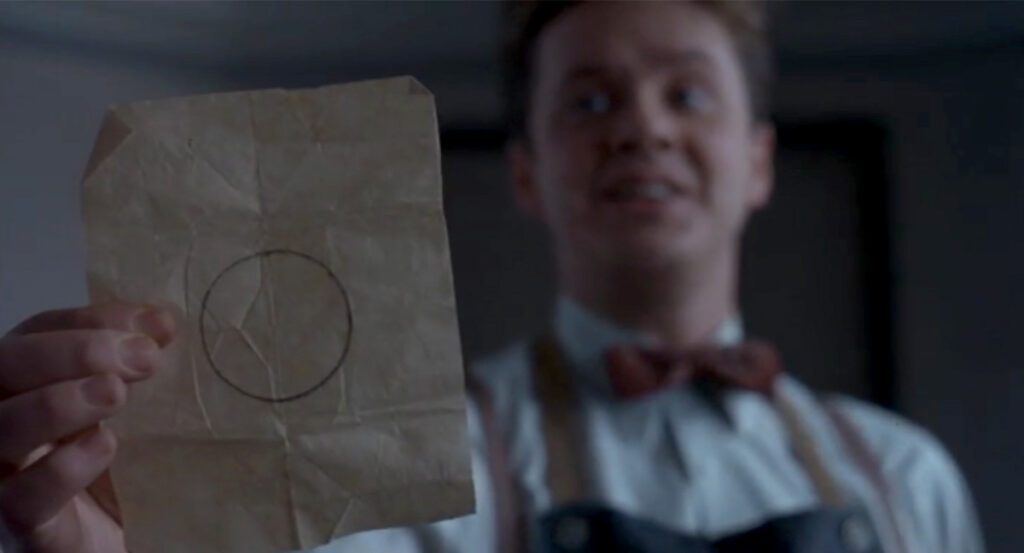
As we all know, a circle has no straight lines. In the perfectly structured world of corporate America in 1958, the circle almost introduces anarchy. The Coens are known for being anarchic. Indeed, many of their films are shot in an anarchic anti-film school manner. Their wry, cynical sense of humor is evident from the opening narration (another Coen trait) to the stylized production design and performances. There’s an absurdism to all of it. The story of an outsider trying to make it in the big city also mirrors the Coen Brothers themselves, who come from small-town Minnesota, much like the Muncie, Indiana, that Norville is from. It also allows the Coens to bring an outsider’s perspective that they’re known for. Like I said earlier, you always remember a Coen Brothers film distinctly. There’s even a fantastical fantasy sequence in Hudsucker that recalls the later one in The Big Lebowski (1998).
The performances all around are fantastic and highly mannered. Newman, Leigh, and Robbins fit in quite well with the Coen Brothers’ sense of mood and timing. Around to help them acclimate to the world of the Coens’ are regulars like John Goodman, Steve Buscemi, and John Polito, who pops up in a throwaway gag that’s almost a reprisal of his Miller’s Crossing character. It was the Coen Brothers’ first chance to work with A-list Hollywood actors at the time, which, if these parts were cast wrong, would’ve resulted in disaster, but thankfully they were perfectly cast.

However, the Hudsucker Proxy is most known for its highly stylized look. Shot on the 1:85:1 35 mm film frame, Roger Deakins gets distinctive colors from this look, including the use of primary colors for the hula hoop itself. This contrasts the big city’s cold, desaturated look (though also gorgeous). The idea is this circle has introduced a little anarchy. Deakins’s photography complements this with precise dolly moves and one-point perspective compositions that reflect the calculating will of corporate forces. The way this movie is shot at times is made to make you feel uncomfortable. There are chaotic whip pans, high-velocity push-ins, unbalanced low-angle compositions, and the playfulness of playing with the fourth wall.
The Coens had worked on this script for ten years before the film’s release. You can tell there was a long wait because they threw everything they got at the screen like this is our ample opportunity. Let’s not hold back. It was budgeted at $25 million in 1994 and was a risk for Warner Bros to release. It reflects a time when studios would take chances on creative filmmakers. For fans of the Coens, this is a must to check out, and for lovers of madcap comedies. The Hudsucker Proxy is a gloriously cynical time and one of my favorite Coen Brother films.
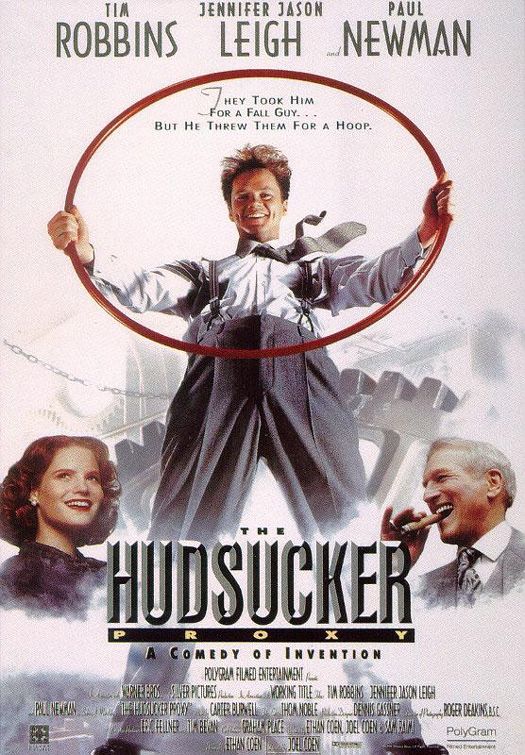
 Movie Finatics The Place for Movie Lovers
Movie Finatics The Place for Movie Lovers
